
A Comprehensive Guide to Finding a Makeup Artist for Funerals
Why Makeup Artists for Funerals Matter More Than You Think
When someone passes away, makeup artist for funerals services restore a natural, peaceful appearance for open-casket viewings. These specialists—also called mortuary cosmetologists or desairologists—blend makeup artistry with restorative skills so families can offer a gentler final goodbye.
Quick Answer: What You Need to Know
- Who: Licensed cosmetologists or funeral directors trained in mortuary makeup
- What: Apply makeup, style hair, perform nail care, restore damaged features
- When: After embalming, usually 2-3 hours before viewing
- Cost: About $250 per service (NFDA)
- Training: 1,000-1,500 hours of specialized education
- Goal: Present the deceased in a lifelike, dignified way
These artists skillfully address post-mortem changes using theatrical pigments, airbrush systems, and wax fillers to recreate natural features.
As suppliers of preparation-room equipment at American Mortuary Coolers, we see daily how their craft completes the care experience and helps families find closure.
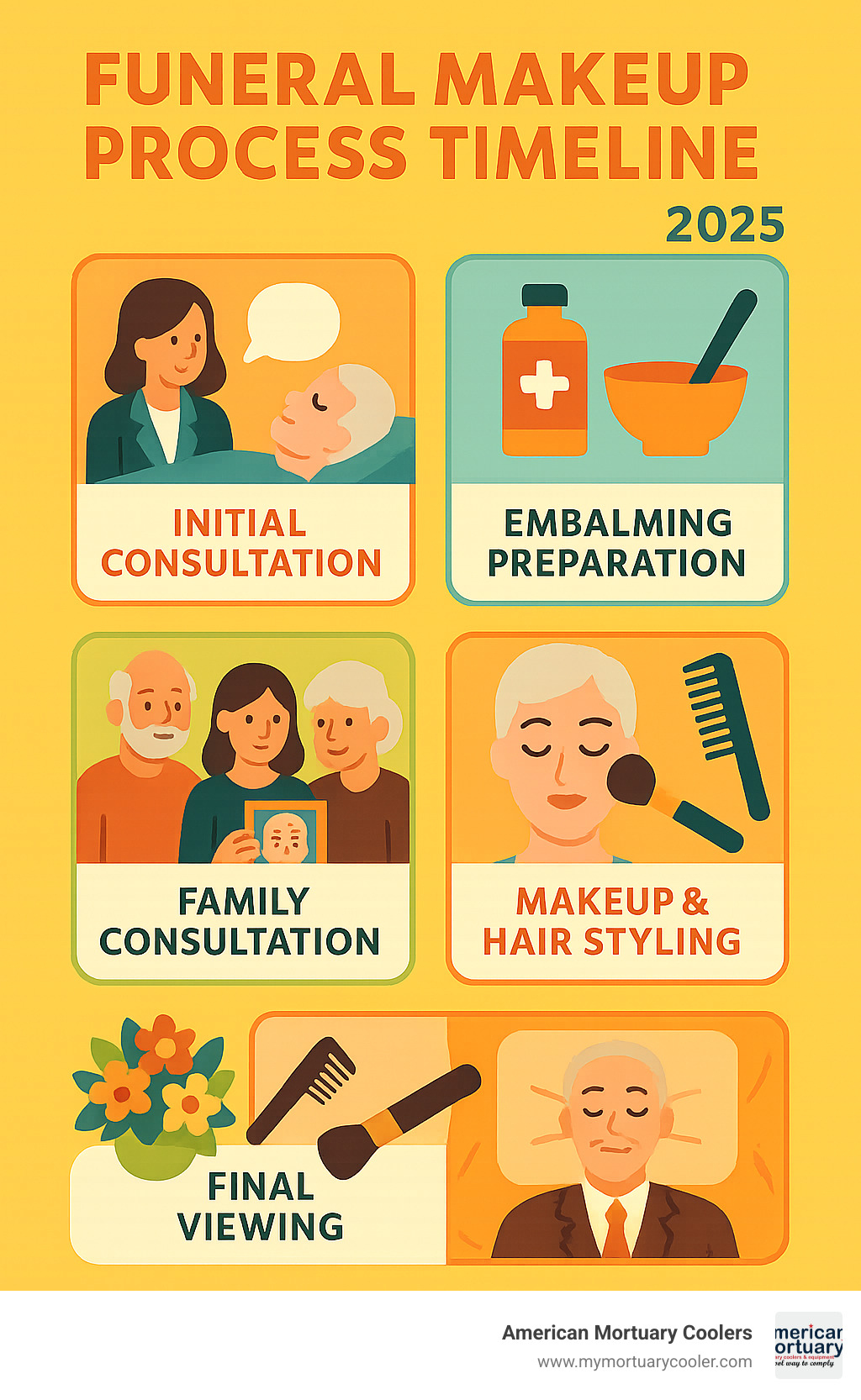
What Does a Funeral Makeup Artist Do?
When you lose someone close to you, the last thing you want is to be shocked by how different they look. That's where a makeup artist for funerals comes in - these caring professionals help restore your loved one's natural appearance so you can remember them as they were in life.
A makeup artist for funerals, also called a mortuary cosmetologist or desairologist, does much more than apply lipstick and foundation. They're specially trained to handle the unique challenges that come after death, working with changes in skin tone and texture that regular makeup artists never encounter.
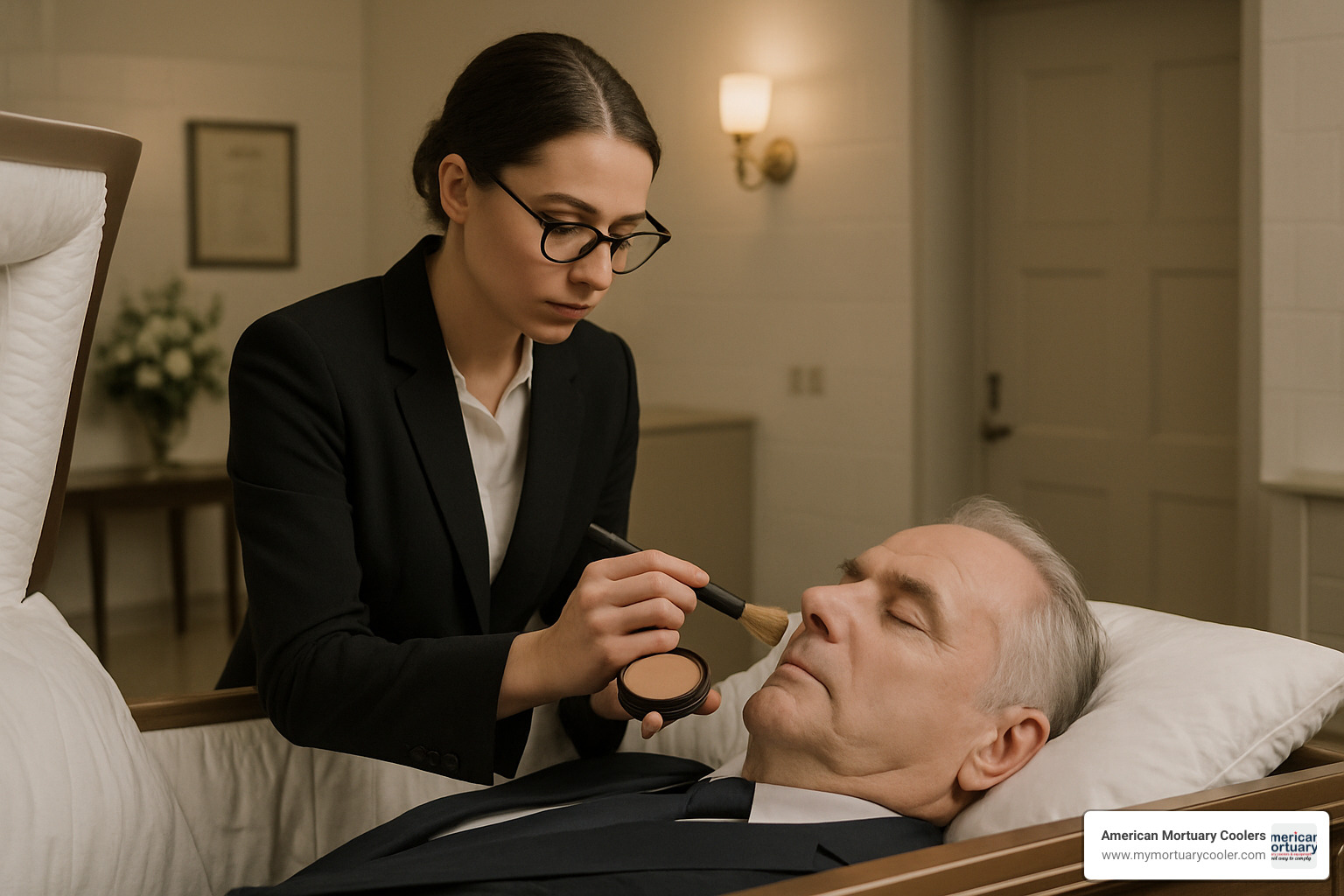
Think of them as artists who specialize in restoration. They might style hair to match how your loved one always wore it, or carefully apply nail polish in their favorite color. When illness or injury has changed someone's appearance, these professionals use wax fillers and restorative art techniques to rebuild features and make everything look natural again.
The tools they use are quite different from what you'd find in a regular makeup kit. Airbrush cosmetics help create smooth, even coverage over delicate skin. Theatrical pigments provide the heavy-duty coverage needed to hide discoloration from medication or illness. Many funeral homes keep specialized product kit essentials that include everything from high-coverage foundations to reconstructive materials.
What makes this work especially meaningful is how it connects to the embalming process. The embalming fluids actually help firm up the skin and add a slight tint, making it easier for the makeup artist to create that lifelike appearance families need to see.
Purpose of Funeral Makeup
The real purpose of funeral makeup isn't about making someone look glamorous - it's about giving families closure. When your loved one looks peaceful and natural, it helps you say goodbye without the shock of seeing how illness or death has changed them.
There's something deeply healing about seeing someone you love look like themselves again. It helps preserve your memories of them as they were in life-like appearance, not as they were in their final days of illness. Many families tell us this makes all the difference in their grieving process.
Cultural traditions also play a big role in funeral makeup. Some families want elaborate preparation to honor their loved one, while others prefer a more natural look. A skilled makeup artist knows how to respect these different wishes and work within various religious and cultural guidelines.
Key Differences from Everyday Makeup
Working on someone who has passed away creates challenges that living people don't have. Without circulation, skin becomes pale and loses its natural warmth. The texture changes too, becoming either too soft without embalming or waxy afterward.
Discoloration correction is a huge part of the job. Medications, illness, or the natural changes after death can cause dramatic color shifts that regular makeup simply can't handle. That's why funeral makeup artists use firming fluids and long-wear products designed specifically for these conditions.
The embalming dyes actually help with makeup application. They firm up the tissue and add a base color that makes it much easier to apply cosmetics evenly. Without this preparation, the skin would be too soft and uneven for traditional makeup techniques to work properly.
How to Choose the Right Makeup Artist for Funerals
Finding the right makeup artist for funerals can feel overwhelming during an already difficult time. But choosing someone with the proper training and gentle approach makes all the difference in honoring your loved one's memory.
Unlike regular makeup artists, mortuary cosmetologists need special licenses and training to work with deceased individuals. State licensing requirements exist for good reason - this work involves unique health and safety considerations that regular beauty school doesn't cover.
When you're looking for a qualified professional, you'll encounter two main educational paths. Cosmetology-licensed artists complete around 1,000 hours of beauty school plus additional mortuary training. They often work as independent contractors or funeral home employees. Mortuary science graduates earn associate's degrees and funeral director licenses, which takes 2-4 years but provides comprehensive funeral service training.
Most funeral homes work with trusted cosmetologists they've used for years. Don't hesitate to ask for referrals and portfolios - reputable professionals understand families want to see examples of their work (shown respectfully, of course).
Cultural sensitivity matters enormously in this field. The best makeup artists take time to understand your family's traditions, religious requirements, and personal preferences. They'll ask thoughtful questions about how your loved one preferred to look and what feels appropriate for your family's beliefs.
Service packages typically range from basic makeup and hair styling to comprehensive restorative work. The average cost runs around $250 according to industry data, though this varies based on the complexity of services needed and your location.
| Route | Education Required | Licensing | Time to Complete | Typical Role |
|---|---|---|---|---|
| Cosmetology License | 1,000 hours beauty school + mortuary training | State cosmetology license | 1-2 years | Independent contractor or funeral home employee |
| Mortuary Science Degree | Associate's degree + mortuary college | Funeral director/embalmer license | 2-4 years | Full-service funeral professional |
Evaluating a Makeup Artist for Funerals: Checklist
The right mortuary cosmetologist combines technical expertise with genuine compassion. When meeting with potential artists, look for someone who demonstrates both professional competence and emotional sensitivity.
Licensing comes first - verify they hold a valid state cosmetology license or funeral director credentials. Most states require 1,000 to 1,500 hours of specialized training plus ongoing continuing education credits. Professional liability insurance protects both you and them.
Pay attention to how they communicate during your initial consultation. Do they ask thoughtful questions about your loved one's appearance preferences? Do they explain their process clearly without being clinical or cold? The best professionals understand this work requires both technical skill and emotional intelligence.
Infection control knowledge is non-negotiable. They should follow OSHA guidelines and demonstrate understanding of proper safety protocols when working in mortuary settings.
Ask about their restorative skills if your situation requires more than basic makeup application. Some cases need advanced techniques like airbrush application or reconstructive work using specialized materials.
For more guidance on funeral home operations and professional standards, check out our resource on funeral home supplies.
Red Flags When Hiring a Makeup Artist for Funerals
Trust your instincts when something feels off. Unlicensed practice tops the list of serious concerns - never work with someone who can't provide proper credentials or claims licensing isn't required.
Rushed meetings signal problems too. Reputable professionals take time to understand your needs and answer questions thoroughly. They won't pressure you into expensive add-ons or demand full payment upfront without a clear service agreement.
No insurance coverage leaves everyone vulnerable. Professional mortuary cosmetologists carry liability insurance specifically for this type of work.
Most concerning is any artist who ignores religious wishes or cultural requirements. This work demands deep respect for diverse traditions around death and viewing practices. Someone who dismisses your family's specific needs isn't the right fit.
Training, Certification & Career Outlook
Becoming a makeup artist for funerals requires more than just regular beauty school training. These professionals need specialized education, state licensing, and ongoing skill development to handle the unique challenges of mortuary cosmetology.
The journey typically starts with one of two main paths. Most people begin with cosmetology school, completing around 1,000 hours of general beauty training before specializing in mortuary work through additional courses or hands-on experience at funeral homes. Others choose the mortuary science route, earning an associate's degree that covers embalming, funeral directing, and cosmetology all in one comprehensive program.
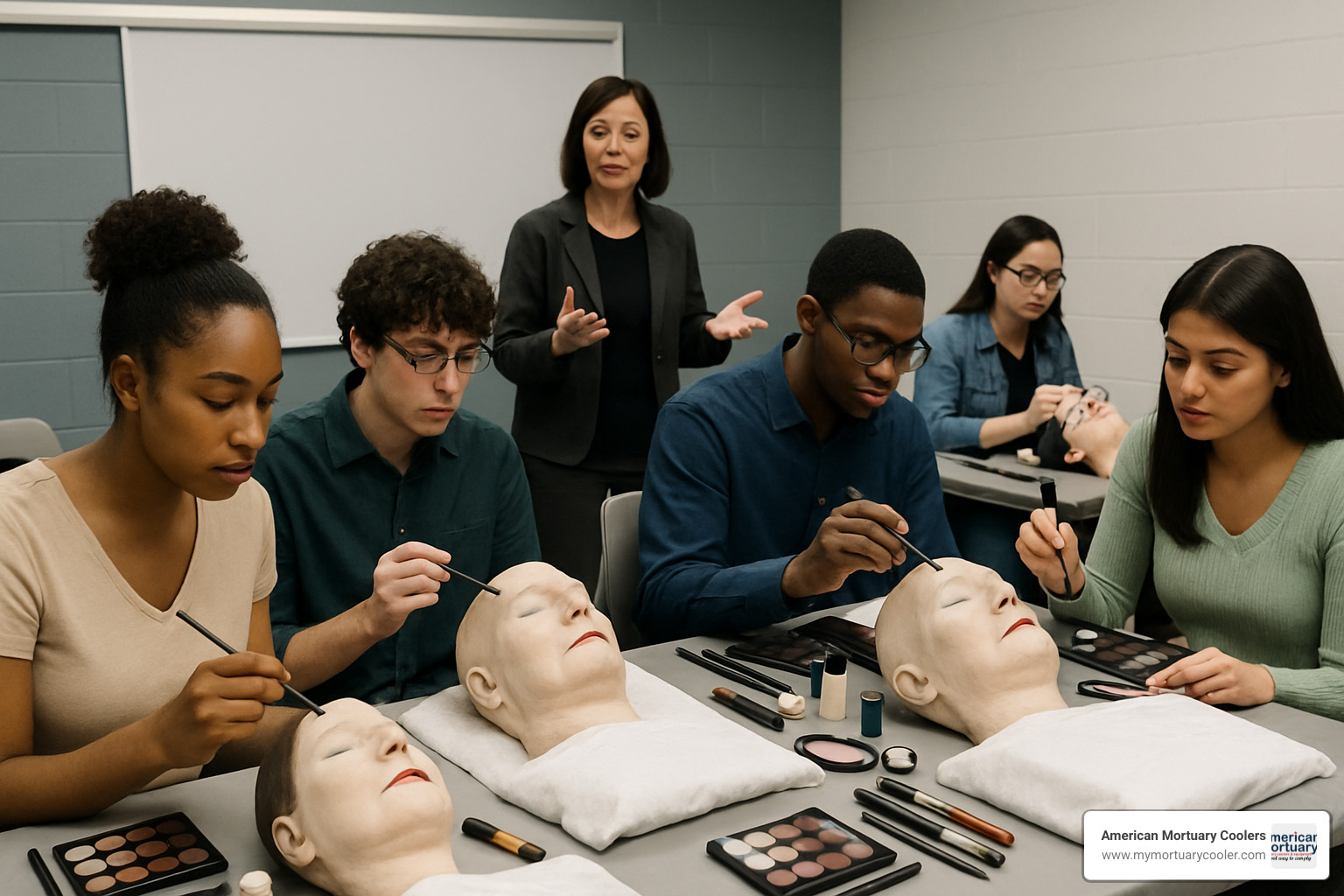
The numbers tell an interesting story about this specialized field. According to industry data, mortuary cosmetologists earn significantly more than regular beauticians - averaging $39,932 annually compared to just $24,300 for general cosmetologists. Entry-level professionals with less than three years of experience typically start around $29,980, while seasoned artists with eight or more years can earn $48,220 or more.
This pay premium reflects both the specialized skills required and the emotional demands of the work. When you consider that funeral homes typically charge around $250 per service for makeup application, it's clear that families value this expertise during such a difficult time.
The career outlook looks promising too. The Bureau of Labor Statistics projects 13% job growth through 2026 - much faster than average for most occupations. This growth reflects America's aging population and the continued importance families place on dignified final presentations of their loved ones.
Most mortuary cosmetologists work in funeral homes and mortuaries, though some find positions in hospital morgues or medical examiner offices. Many also work as independent contractors, serving multiple funeral homes in their area.
For comprehensive industry data, the Funeral statistics from NFDA provides valuable insights into market trends and professional opportunities.
Licensing Requirements by State
Every state requires proper licensing for mortuary cosmetology work, though the specific requirements vary depending on where you practice. The good news is that most states follow a similar framework that makes the process fairly straightforward.
The foundation starts with 1,000 to 1,500 hours of specialized training focused on anatomy, chemistry, safety protocols, and hands-on techniques. This training goes far beyond regular makeup application - students learn about post-mortem changes, chemical interactions with embalming fluids, and reconstructive techniques.
After completing their education, aspiring mortuary cosmetologists must pass both a written examination and a practical demonstration of their skills. The written test covers everything from skin anatomy to OSHA safety requirements, while the practical exam shows they can actually perform the work to professional standards.
Continuing education credits keep professionals current with new techniques and safety requirements. Most states require ongoing training to maintain licensure, ensuring that makeup artists stay updated on best practices and industry developments.
Several types of licenses allow professionals to perform mortuary cosmetology work. A standard cosmetology license with mortuary specialization is the most common route. Funeral director licenses typically include cosmetology privileges, as do embalmer licenses. Some states also offer specialized mortuary cosmetology licenses designed specifically for this field.
Tools & Products in a Mortuary Kit
Professional mortuary cosmetologists rely on a carefully curated collection of specialized tools and products designed specifically for post-mortem application. While some items overlap with regular beauty supplies, many are uniquely formulated for the challenges of working with deceased individuals.
Airbrush systems form the backbone of most professional kits, allowing for smooth, even application over delicate reconstructive work. High-quality brushes designed for precise application on fragile skin are essential, along with palette knives for mixing custom colors and applying reconstructive materials.
The product selection combines mortuary-specific formulations with carefully chosen consumer cosmetics. Mortuary cosmetics are specially formulated for post-mortem skin conditions, offering better adhesion and longer wear than regular makeup. Theatrical pigments provide the high coverage needed to mask severe discoloration, while reconstructive materials like specialized waxes and clays help restore damaged features.
Many experienced professionals have found that certain consumer products work exceptionally well in mortuary settings. Popular choices include Fenty Beauty Pro Filt'r foundation for its excellent coverage, IT Cosmetics CC+ Cream for color correction, and L'Oréal Age Perfect Satin Lipstick for natural-looking lip color.
Setting sprays and long-lasting formulations ensure the makeup withstands extended viewing periods and potential contact from mourners. Some professionals also work with embalming fluid tints - colorants added during the embalming process to create a better base for makeup application.
For more comprehensive information about essential mortuary equipment and supplies, our guide on Essential Mortuary Equipment: A Professional's Guide to Key Funeral Supplies covers everything funeral professionals need to know about outfitting their facilities properly.
Cost, Ethics & Family Collaboration
Understanding the financial, ethical, and collaborative aspects of funeral makeup services helps families make informed decisions while ensuring their loved one receives respectful, appropriate care.
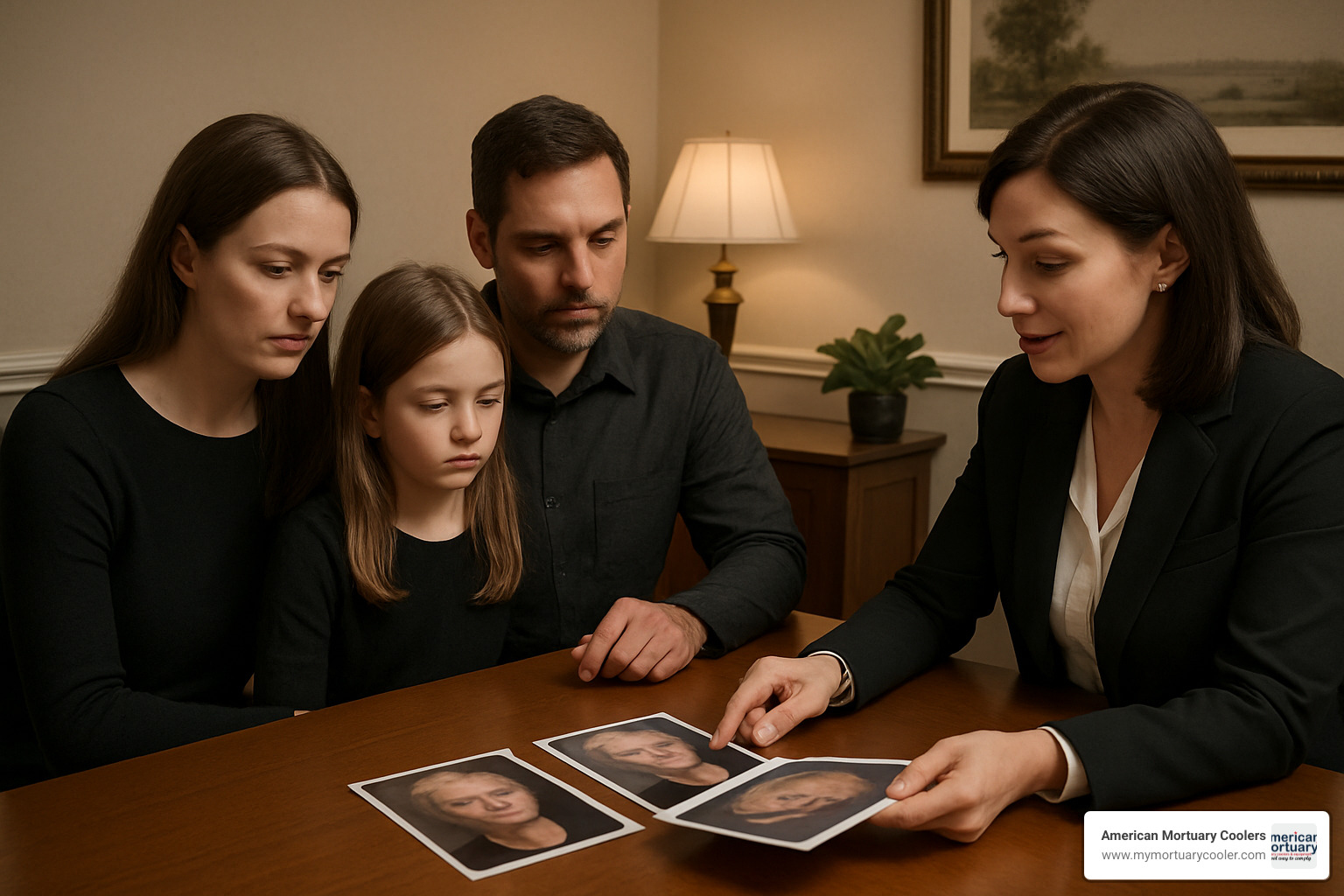
Cost Structure: According to NFDA data, post-death makeup averages $250 per funeral, representing "only a fraction of the cost for burials." This modest fee covers:
- Initial family consultation
- Makeup application and styling
- Minor restorative work
- Final touch-ups before viewing
Service Tiers:
- Basic Service ($150-200): Simple makeup and hair styling
- Standard Service ($200-300): Comprehensive cosmetic preparation
- Premium Service ($300-500+): Extensive restorative work and reconstruction
Ethical Considerations: Professional mortuary cosmetologists operate under strict ethical guidelines:
Consent Requirements:
- Written permission for any permanent changes (hair cutting, nail trimming)
- Family approval for all cosmetic choices
- Respect for religious and cultural restrictions
- Documentation of all services provided
Cultural Sensitivity: As one professional emphasized, "Respect cultural or personal features (e.g., long fingernails) to avoid offending the family." This includes understanding various traditions around death care and post-mortem preparation.
Religious Considerations: Some faiths have specific requirements or restrictions regarding post-mortem care:
- Orthodox Jewish traditions may prohibit certain cosmetic procedures
- Islamic customs typically require minimal intervention
- Hindu practices may include specific ritual preparations
- Christian denominations vary in their approaches
For comprehensive information about embalming and related services, visit this Consumer guide on embalming.
How Families Can Influence the Process
Family involvement in the makeup and styling process can be deeply meaningful and therapeutic. Many funeral professionals encourage this participation as part of the healing process.
Ways Families Can Participate:
Reference Materials:
- Provide recent photographs showing preferred makeup style
- Share information about favorite cosmetic brands or colors
- Describe typical hairstyle and grooming preferences
- Discuss any distinctive features to emphasize or minimize
Personal Items:
- Bring the deceased's own makeup collection
- Provide favorite hair styling products
- Share jewelry or accessories for the service
- Offer clothing that influences makeup choices
Direct Participation:
- Assist with final hair styling in the viewing room
- Apply final touches to makeup with guidance
- Participate in nail care and polish application
- Help position the deceased for optimal presentation
Communication:
- Discuss cultural or religious requirements
- Share concerns about appearance or presentation
- Request specific techniques or avoid certain procedures
- Provide feedback during the preparation process
As one funeral director shared, "Family members styling their mother's iconic bouffant hair in the viewing room" created a meaningful moment of connection and closure.
For more information about funeral home services, visit our A-Z Guide to Funeral Home and Mortuary Services.
Common Misconceptions
Several myths persist about funeral makeup that can cause unnecessary anxiety or confusion for families:
Myth 1: Embalming is Always Required for Makeup Reality: While embalming makes makeup application easier by firming the tissue, it's not legally required in most cases. Some makeup can be applied to unembalmed bodies, though the results may be more limited.
Myth 2: Funeral Makeup is Always Heavy and Unnatural Reality: Modern mortuary cosmetologists focus on natural, subtle applications. As one professional noted, "Mortuary makeup does not need to be caked on." The goal is to restore a lifelike appearance, not create a heavily made-up look.
Myth 3: Families Have No Say in the Process Reality: Families have significant input in makeup and styling decisions. Professional artists actively seek family guidance and often incorporate personal items and preferences into their work.
Myth 4: The Service is Extremely Expensive Reality: At an average of $250 per service, funeral makeup represents a small fraction of total funeral costs. Many families find the emotional benefits far outweigh the modest expense.
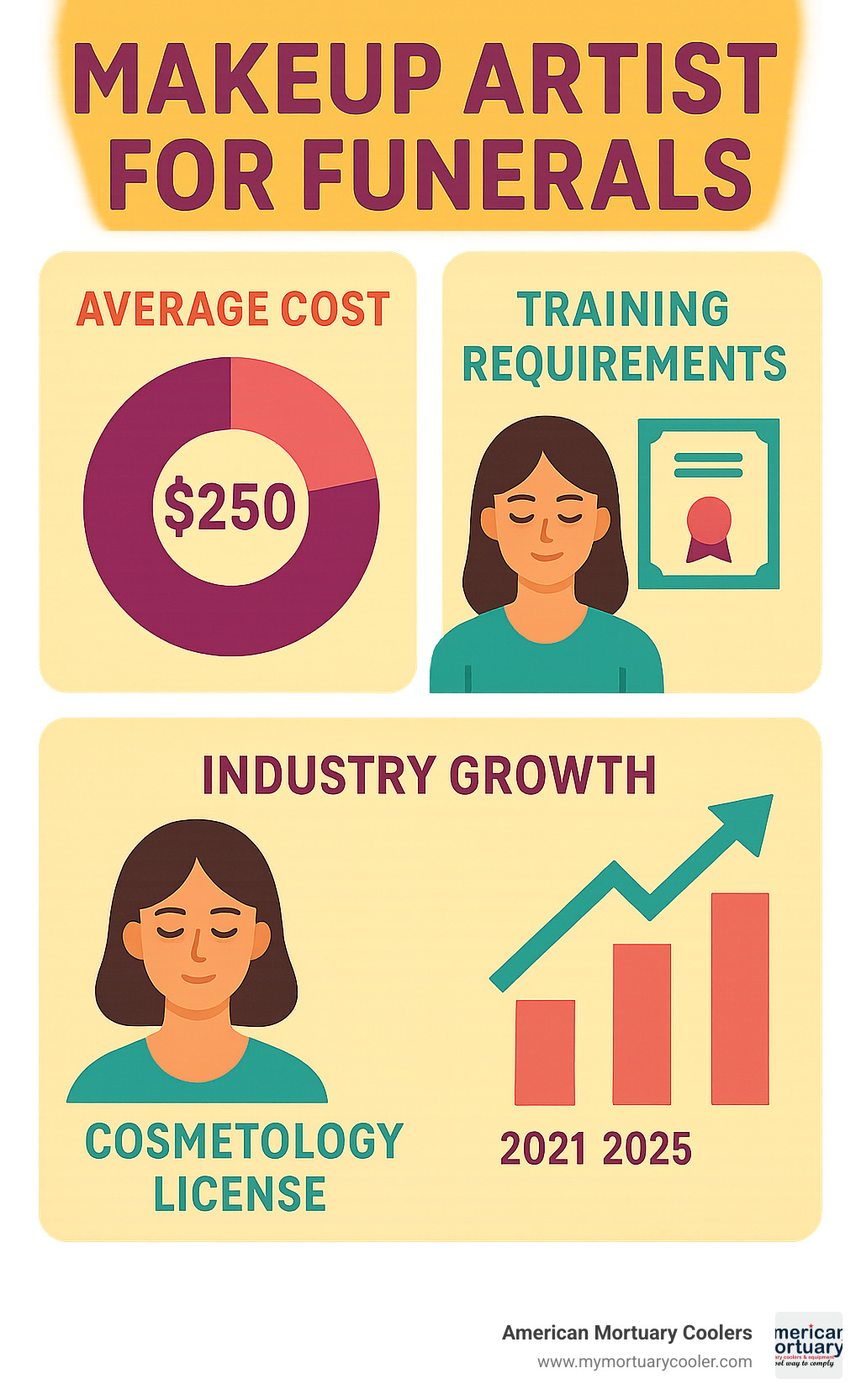
Frequently Asked Questions about Makeup Artists for Funerals
When families are planning funeral services, questions about makeup application often arise during an already emotional time. Understanding the practical aspects of funeral makeup can help reduce stress and ensure your loved one receives the respectful care they deserve.
How long does funeral makeup last?
Professional funeral makeup is specifically designed to maintain its appearance throughout the entire viewing period and beyond. Most makeup artists for funerals use specialized techniques and products that keep the makeup looking natural for 8-12 hours or longer, depending on several factors.
The longevity depends heavily on embalming quality - when tissue is properly firmed through embalming, makeup adheres better and lasts significantly longer. Environmental conditions also matter, as temperature and humidity in the viewing room can affect how well cosmetics hold up over time.
Professional mortuary cosmetologists rely on mortuary-grade products rather than everyday cosmetics because they're formulated to withstand the unique challenges of post-mortem application. These products resist smudging, fading, and transfer better than standard makeup.
One consideration many families don't expect is physical contact during viewing. Mourners often kiss, touch, or accept the deceased during their final goodbye. Experienced professionals account for this by applying setting sprays and protective techniques that help the makeup withstand these meaningful moments of connection.
Can we use the deceased's own makeup?
Absolutely, and many families find this approach deeply meaningful. Using your loved one's personal makeup collection often creates the most authentic and familiar appearance, which can be comforting during the grieving process.
There are several practical benefits to providing personal cosmetics. The colors and shades are already matched to your loved one's preferences and skin tone. There's also emotional significance in using products they chose and wore during their lifetime. This approach can also help with costs, as you're providing materials the makeup artist would otherwise need to supply.
However, there are some important considerations to keep in mind. The makeup needs to be in good condition - old or contaminated products won't work well. Some personal items may need to be supplemented with professional products to achieve the best results, especially for color correction or long-wear properties.
Professional funeral makeup artists follow strict sanitation protocols regardless of whose products they use. They'll assess each item to ensure it's suitable for the application and safe to use in the mortuary environment.
As one experienced mortician explained, "Families often provide the decedent's personal makeup to achieve a more life-like appearance." This personal touch helps create the natural look that brings comfort to grieving families.
Is embalming mandatory for makeup application?
Embalming is not legally required for makeup application in most areas, but it makes a dramatic difference in the quality and durability of the final results. Understanding this distinction helps families make informed decisions about their options.
Without embalming, the makeup artist faces significant challenges. The tissue remains soft and difficult to work with, limiting the types of cosmetics that can be applied effectively. The timeframe for viewing is also much shorter, and the final appearance may be less natural than families hope for.
With embalming, the process becomes much more manageable and effective. The embalming fluids firm the tissue, creating a stable base for makeup application. Many embalmers also add tinted fluids during the process, which provide better color correction and a more natural foundation for cosmetics.
The embalming process also allows for longer viewing periods, which many families appreciate. Extended visitation times give more people the opportunity to pay their respects, and the makeup will maintain its appearance throughout.
Religious and cultural considerations often influence this decision. Some faiths discourage or prohibit embalming, while others have no restrictions. Your funeral director and makeup artist can work within these requirements to provide the best possible results regardless of your family's choices.
The decision ultimately comes down to family preferences, cultural requirements, and timing needs. Some families choose minimal makeup on unembalmed bodies for immediate viewing, while others prefer the improved results that embalming makes possible. A qualified makeup artist for funerals can explain the realistic outcomes for either approach and help you make the choice that's right for your situation.
Conclusion
Finding the right makeup artist for funerals can feel overwhelming during an already difficult time, but understanding what to look for makes the process much easier. These dedicated professionals bring years of specialized training - typically 1,000 to 1,500 hours - along with the gentle touch and cultural sensitivity that families need most.
The investment is modest, with services averaging around $250, but the emotional return is immeasurable. When families see their loved one looking peaceful and natural, it creates space for healing and proper goodbyes. This isn't just about cosmetics - it's about dignity, respect, and helping you remember someone exactly as they were in life.
What matters most is finding someone who listens to your family's needs, respects your cultural or religious traditions, and has the proper licensing to do the work safely. Whether you need basic makeup application or more complex restorative work, the right professional will guide you through every decision with patience and understanding.
At American Mortuary Coolers, we've spent years supporting funeral professionals nationwide with the reliable equipment they need to serve families well. Our custom mortuary coolers and preparation room equipment help maintain the perfect environment for all aspects of funeral care, including the delicate artistry of mortuary cosmetology.
The relationship between families and their chosen makeup artist often becomes deeply meaningful. Many families tell us that being involved in this final act of care - whether providing favorite photos, personal makeup, or simply being present during the process - becomes an important part of their healing journey.
Remember this: you have choices, you have a voice, and you deserve professionals who honor both. Take time to ask questions, verify credentials, and trust your instincts. The right makeup artist for funerals will never rush you or dismiss your concerns.
Your loved one deserves to be remembered with dignity and grace. By choosing qualified, compassionate professionals who understand both the technical and emotional aspects of their work, you're giving yourself and your family a precious gift - the chance to say goodbye with peace in your hearts.
For comprehensive information about funeral industry equipment and supplies that support these important services, explore our detailed guide: Exploring Essential Funeral Products and Supplies.
This final act of care isn't just professional service - it's love made visible during one of life's most tender moments.



